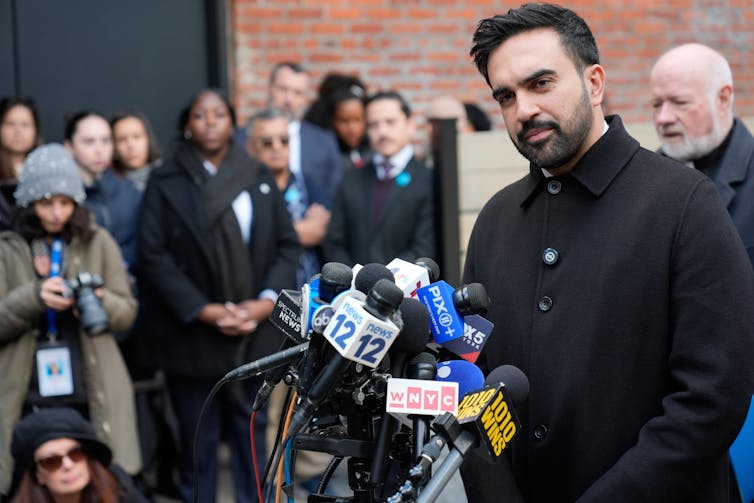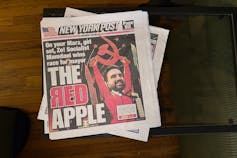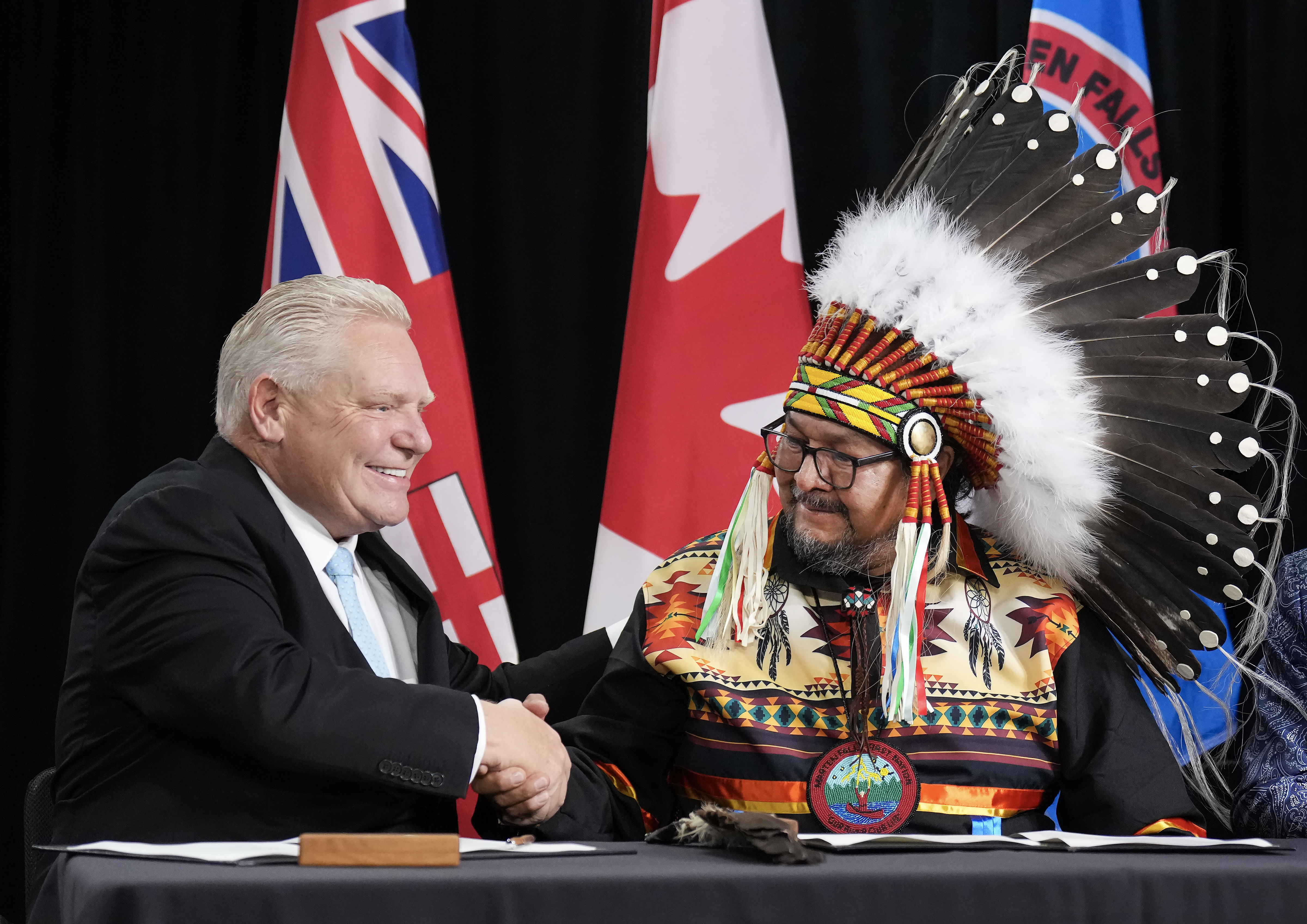- Home
Edition
Africa Australia Brasil Canada Canada (français) España Europe France Global Indonesia New Zealand United Kingdom United States Edition:
Global
Edition:
Global
- Africa
- Australia
- Brasil
- Canada
- Canada (français)
- España
- Europe
- France
- Indonesia
- New Zealand
- United Kingdom
- United States
 Academic rigour, journalistic flair
Academic rigour, journalistic flair
 Zohran Mamdani, recently elected mayor of New York City, talks in the Oval Office of the White House, next to United States President Donald Trump, after a Nov. 21, 2025 meeting.
(AP Photo/Evan Vucci)
Beyond Zohran Mamdani: Social media amplifes the politics of feelings
Published: November 27, 2025 3.50pm GMT
Merlyna Lim, Carleton University
Zohran Mamdani, recently elected mayor of New York City, talks in the Oval Office of the White House, next to United States President Donald Trump, after a Nov. 21, 2025 meeting.
(AP Photo/Evan Vucci)
Beyond Zohran Mamdani: Social media amplifes the politics of feelings
Published: November 27, 2025 3.50pm GMT
Merlyna Lim, Carleton University
Author
-
 Merlyna Lim
Merlyna Lim
Canada Research Professor, School of Journalism and Communication, Carleton University
Disclosure statement
Merlyna Lim does not work for, consult, own shares in or receive funding from any company or organisation that would benefit from this article, and has disclosed no relevant affiliations beyond their academic appointment.
Partners
Carleton University provides funding as a member of The Conversation CA.
Carleton University provides funding as a member of The Conversation CA-FR.
View all partners
DOI
https://doi.org/10.64628/AAM.55pveredk
https://theconversation.com/beyond-zohran-mamdani-social-media-amplifes-the-politics-of-feelings-269792 https://theconversation.com/beyond-zohran-mamdani-social-media-amplifes-the-politics-of-feelings-269792 Link copied Share articleShare article
Copy link Email Bluesky Facebook WhatsApp Messenger LinkedIn X (Twitter)Print article
Zohran Mamdani’s election as New York City mayor has spurred global celebrations and pride. Scores of social media users worldwide celebrate and claim him as one of their own.
Muslims across the globe, including in Indonesia — home to the world’s largest Muslim population, where I was born and raised — rejoice that he is Muslim. Indians take pride in Mamdani’s Indian roots. Ugandans cheer his victory because Kampala is his birthplace.
Representation does matter. It can be deeply affirming to see someone whose identity resonates with you succeed in a foreign political landscape.
However, Mamdani didn’t win simply because of who he is. He won because of what he did, the politics that his campaigns were based on — a platform that focuses on the cost of living, from utility bills to grocery bills to bus fares to child care to rent — and, more importantly, the feelings, the trust and cohesion generated in the network of people who organized with and for him.
As a scholar who examines digital media and information technology in relation to citizen participation and democracy, I know that political behaviour research has long observed that voters don’t choose based on policy alone: they vote based on identity, group belonging, emotional attachments and symbolic cues, all of which speak to “the politics of feelings.”
This refers to politics that mobilize and build power through shared feelings and emotional bonds.
Read more: Zohran Mamdani’s transformative child care plan builds on a history of NYC social innovations
 New York City mayor-elect Zohran Mamdani, centre, speaks in front of the Unisphere alongside his transition team, from left, Elana Leopold, Melanie Hartzog, Maria Torres-Springer, Grace Bonilla, and Lina Khan, in the Queens borough of New York, Nov. 5, 2025.
(AP Photo/Heather Khalifa)
New York City mayor-elect Zohran Mamdani, centre, speaks in front of the Unisphere alongside his transition team, from left, Elana Leopold, Melanie Hartzog, Maria Torres-Springer, Grace Bonilla, and Lina Khan, in the Queens borough of New York, Nov. 5, 2025.
(AP Photo/Heather Khalifa)
Identity, platform, visibility
That Mamdani is Muslim — the son of a South Asian African Muslim father and a Hindu Indian mother, born in Uganda — and that he has lived an immigrant community experience in New York is a formidable part of his story.
This profoundly matters in a political landscape that often marginalizes such identities — and helps explain why he has become so visible online and globally.
Viral videos, algorithmically boosted content and his public persona amplified this visibility. Online, the Zohran Mamdani phenomenon illustrates the power of emotion-driven mobilization, the process through which emotional currents bring people into alignment or connection with a cause, figure or community.
Identity and emotion have always been central to politics. Social media didn’t invent the politics of feelings; it accelerated and amplified them.
Branding a politician
Social media political participation doesn’t operate within a deliberative civic culture, but within an algorithmic marketing culture where algorithmic targeting and data-driven marketing principles shape how persuasion, visibility and emotion circulate.
Branding shapes the way content looks and feels. Algorithms push what’s likely to grab attention, and human users — naturally drawn to emotion — interact with it, feeding the system in return. Together, they produce a self-reinforcing loop where high-arousal content dominates, as a consequence of the interplay of marketing logic, machine learning and user behaviour.
The algorithm rewards emotion, not analysis. It privileges what’s instantly legible — a name, a face, a faith — over the collective labour and work behind a political movement.
Hope, pride as well as fear, outrage
Posts highlighting Mamdani’s Muslim, immigrant or brown identity, whether in celebration or attack, elicit emotions — hope, pride, fear or outrage. These emotions fuel engagement, which algorithms amplify, generating cycles of visibility which can simultaneously mobilize support and provoke backlash.
Read more: The urgent need for media literacy in an age of annihilation
Indeed, the same identity categories that make him so celebrated abroad have also been weaponized against him at home in the United States.
Through social media disinformation fuelled by racism and Islamophobia, Mamdani’s opponents have framed him as a “Muslim extremist,” “communist,” “jihadi terrorist,” “brown” and “dirty” or a “threat” to American values.
The flattening happens from both sides: he is either attacked for his identity or adored because of it.
The irony is sharp. For example, some Indonesians embrace a man named Mamdani — Mamdanis are part of the Khoja Shia community — while turning a blind eye to anti-Shia persecution at home.
Similarly, some Modi supporters claim Mamdani’s Indian heritage without acknowledging that he is a vocal critic of Modi.
Read more: Listen: Indian PM Modi is expected to get a rockstar welcome in the U.S. How much is the diaspora fuelling him?
Identity becomes politicized
We can see similar dynamics elsewhere. Sadiq Khan’s visibility as a Muslim mayor of London generated both celebration and Islamophobic backlash on social media, amplified through viral videos, memes and algorithmically boosted news cycles.
In Canada, former prime minister Justin Trudeau’s youthful, multicultural and photogenic persona generated strong emotional attachment and global circulation while overshadowing his substantive political work.
This is how identity becomes politicized. By focusing the debate on who someone is, attention is diverted from what they stand for. It’s easier to categorize than to engage with structural critique.
 New York City mayor-elect Zohran Mamdani talks to reporters at a news conference in New York, Nov. 17, 2025.
(AP Photo/Seth Wenig)
New York City mayor-elect Zohran Mamdani talks to reporters at a news conference in New York, Nov. 17, 2025.
(AP Photo/Seth Wenig)
In an algorithmic age, we consume politics in byte sizes, where visibility often displaces understanding and emotional attachment overshadows knowledge-seeking. It’s easier to celebrate a face than to join a struggle.
Emotion meets lived experience
But visibility is not the same as electoral power. We learn from Mamdani’s case that, for local politics, symbolism is rarely enough. It operates in a different register from national or global scales.
While Mamdani’s online persona benefited from algorithmic amplification, his campaign was also built on grassroots, volunteer-based mobilization combining door-knocking and neighbourhood conversations across the city of New York.
In local elections, voters aren’t distant algorithmic audiences. They’re neighbours, co-workers and community members who experience the effects of policy in their daily lives. A candidate’s identity, promises and track record must resonate with the residents’ tangible needs. Branding and emotional attachment help, but they cannot replace direct knowledge of local realities and persistent organizing work.
Mamdani platform
To cast a ballot for Mamdani in New York, voters needed to not only embrace his identities, but also his platform and the fact that, like Bernie Sanders and Alexandria Ocasio-Cortez, he’s unapologetically a democratic socialist.
 A New York Post headline announces Zohran Mamdani’s victory in the New York City mayor’s race on Nov. 4, 2025, in Rutherford, N.J.
(AP Photo/Ted Shaffrey)
A New York Post headline announces Zohran Mamdani’s victory in the New York City mayor’s race on Nov. 4, 2025, in Rutherford, N.J.
(AP Photo/Ted Shaffrey)
The word “socialism” is not widely accepted in the United States, as it’s often conflated with “communism” — the remnant of Cold War anti-communism propaganda. It’s not popular in Indonesia, India and Uganda either.
Whether Mamdani will fulfil his voters’ expectations is too early to tell. What is clear is that his story isn’t just about Muslim pride or immigrant success. It’s about what’s possible when people organize across differences for a common cause. It’s about choosing to see beyond who someone is to what they stand for.
- Digital media
- Democratic socialism
- New York City
- Citizen participation
- immigrant narratives
- Zohran Mamdani
Events
Jobs
-
 Senior Lecturer, Human Computer Interaction
Senior Lecturer, Human Computer Interaction
-
University Lecturer in Early Childhood Education
-
 Case Specialist, Student Information and Regulatory Reporting
Case Specialist, Student Information and Regulatory Reporting
-
 Lecturer in Paramedicine
Lecturer in Paramedicine
-
 Associate Lecturer, Social Work
Associate Lecturer, Social Work
- Editorial Policies
- Community standards
- Republishing guidelines
- Analytics
- Our feeds
- Get newsletter
- Who we are
- Our charter
- Our team
- Partners and funders
- Resource for media
- Contact us
-
-
-
-
Copyright © 2010–2025, The Conversation

 Senior Lecturer, Human Computer Interaction
Senior Lecturer, Human Computer Interaction
 Case Specialist, Student Information and Regulatory Reporting
Case Specialist, Student Information and Regulatory Reporting
 Lecturer in Paramedicine
Lecturer in Paramedicine
 Associate Lecturer, Social Work
Associate Lecturer, Social Work



